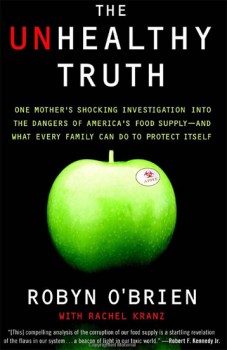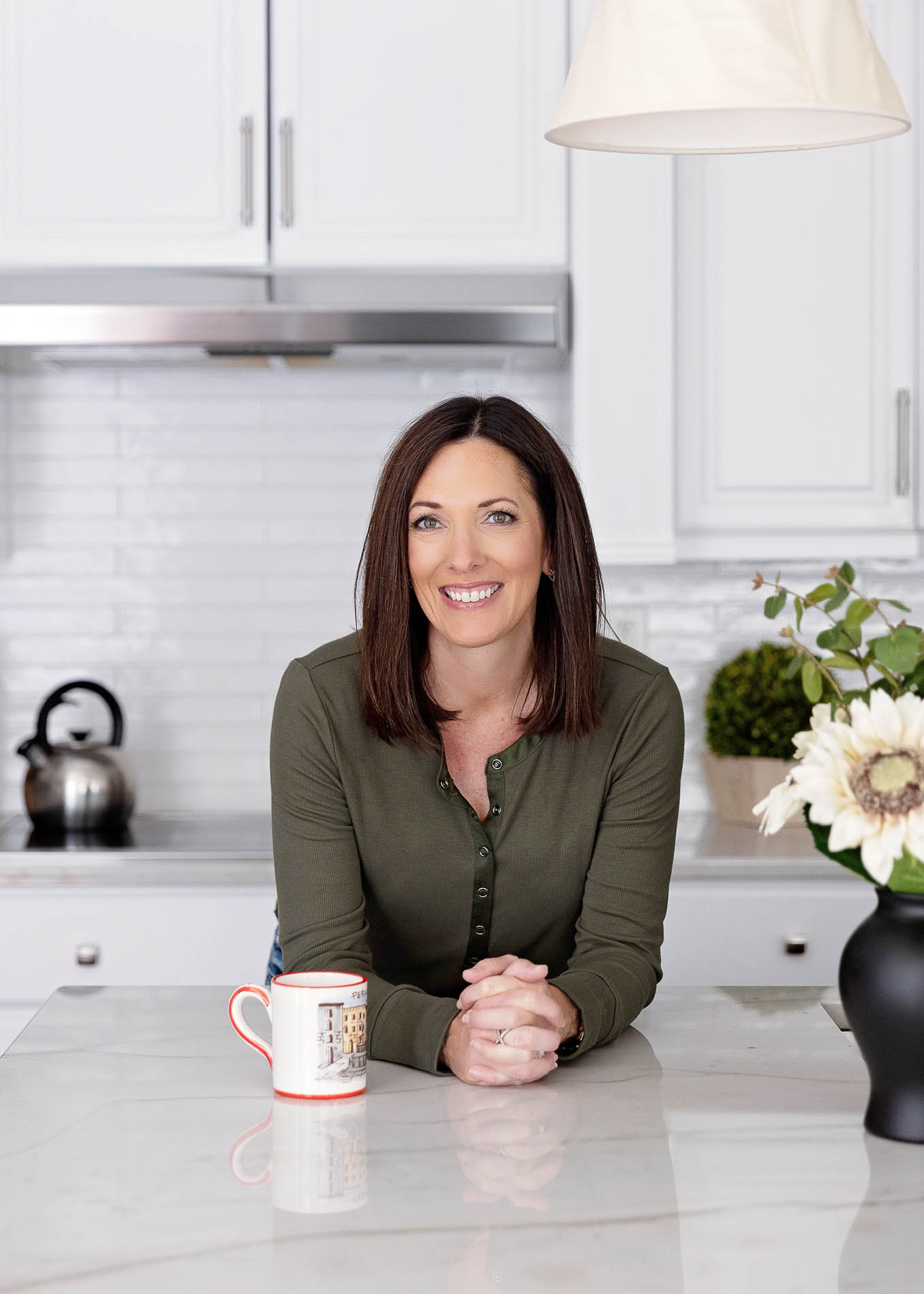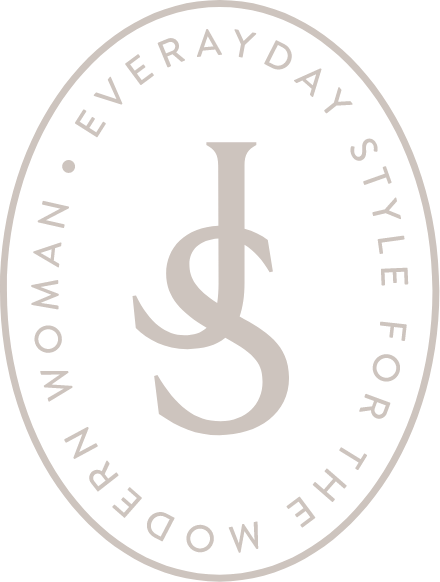I just finished reading Robyn O’Brien’s book, The Unhealthy Truth: One Mother’s Shocking Investigation into the Dangers of America’s Food Supply– and What Every Family Can Do to Protect Itself. It’s incredibly eye opening. Nothing I’m learning is a surprise, rather it confirms so much of what I’ve learned over the past couple of years.

I think what is so frustrating about this particular issue is that I feel so duped — duped by the food industry and the government agencies that are charged with keeping us safe but end up being so heavily influenced by the special interests groups and the food and drug industries that they have sorely neglected their duties, and now we have two entire generations suffering for it.
In her book, Robyn shares her story of discovery. After one of her children is diagnosed with a food allergy, she asks the questions that I hear so often, “What is causing this food allergy epidemic?” and “Since when did food become dangerous?”
As a mother of a child with food allergies, I get these questions a lot. There are many theories, but unfortunately no definite answers. But Robyn wasn’t satisfied with that. In fact, she puts me to shame, because I found myself in her shoes — not once, but twice, I sat in a doctor’s office with a child diagnosed with a potentially deadly food allergy. And it never occurred to me to find out why. I just treated it as advised by my doctor and went on about my life. I guess I figured if the doctors don’t know, then how do I expect to figure it out.
Robyn, however, wasn’t satisfied with this. A former equity analyst, she immediately put her skills to use and set out to discover why food allergies are suddenly so pervasive in our society. What she learned about the food industry shocked and horrified her. Much of it is not new to me, but some of it is, and as I read her book, I find myself getting downright angry.
How is it that the very institution designed to protect us has been so manipulated and influenced by corporate interests?
I love it when Robyn says, “I was raised on capitalism and the Wall Street Journal.” I think this is why I regard her work so highly. She is a mom, like me, who trusted and revered her government, like me, and found herself and her children victims of the corruption and greed that all too easily transforms a noble institution. Suddenly all is not well with the world. And Mama Bear is rip-roarin’ mad.
Melodramatic? Maybe. But wait till you read this book.
It took me several weeks to read her book, because I had to stop every once in a while and walk away and take time to digest the information and get over my astonishment at much of it. It’s a fascinating read because she takes us along in her journey, telling her story infused with what she learned along the way.
She shares stats on the rise of food allergies in the past 20 years and the correlation between allergies, asthma and eczema. She lists the various hypotheses and why she believes it is the changes in our food system that are primarily to blame for this huge rise in allergies over the same time period. Food simply isn’t the same as it was when we were growing up — even processed foods have been changed for the worse.
She goes into how these food changes happened and why they only happened here in America. Yes, you read that right. Perhaps the most shocking and sickening bit of information she uncovers is how food companies like Kraft and Pepsi actually formulate foods differently for other countries because those countries don’t allow artificial colors and growth hormones in their food supply, and what genetically modified ingredients are allowed must be labeled as such.
She explains GMOs and growth hormones and how they were allowed into our food supply and why we should be wary of these new technologies.
She talks you through the complicated relationship between non-profits and food corporations and the FDA, and you realize that there really is no one who is unbiased in this system, not even those who you may expect to be.
She explains how most studies are usually funded by the groups that stand to gain the most from the approval of the product, which is why so many hot button issues appear to be inconclusive when you look at the “evidence.”
Knowing her limitations as a scientist, Robyn consults with various experts and backs up her claims with statistics and facts, and she is careful in the way she words her assumptions versus the facts available. This isn’t the be all end all in the food allergy debate, but she makes a good case for taking precautions with the food we eat and feed our kids.
First and foremost, she is a mom. She is not afraid to say, “I used to look at people who were particular about their food like they were crazy.” She is not afraid to say, “Now I wish I had been more understanding and compassionate because now they look at me that way.” (Those aren’t direct quotes. I can’t locate them to reference exactly what she said.)
I can so relate to that.
I liked myself better when I was the laid back mom — the one who didn’t mind if my kids pigged out on junk and let them buy from the ice cream truck every time it came around the block. But the more I know, the more I feel that I have to protect them from the establishment. If I won’t, who will?
I won’t lie. There were times when I found this book horribly discouraging. But Robyn doesn’t leave us hanging. She goes into ways we can all contribute to the change that must be made if we’re going to turn the health of our nation’s children back around and going in the right direction. And just her own tenacity with her message is an encouragement in and of itself.
At the end, she details how she changed the food she fed her family for each meal and snacks. The one thing I took away from this section is, everyone has to start where they are. I know that some of you read about the way we eat in my house, and you’re rolling your eyes and thinking, “Um yeah, NOT happening.” Okay, fair enough. But that’s no reason to bury your head in the sand. Everyone has to start where they are.
When I discovered Michael Pollan and Nina Planck, we already ate a fairly healthy diet — by U.S. standards, anyway. My family was used to eating whole grains and a variety of fruits and vegetables. I can count on one hand the times in my life I bought Pop Tarts or Lunchables. I understand that going from Lucky Charms to homemade granola is a stretch, but it’s like I always say — it’s not all or nothing.
Robyn is fond of saying, “No one can do everything, but everybody can do one thing.”
Her other mantra is, “Don’t let the perfect become the enemy of the good.”
I think it’s really important to keep that perspective; otherwise we’ll get discouraged and give up.
While I highly recommend Robyn’s book for anyone because of the plethora of information she shares, I particularly recommend it for those who want to eat better but aren’t ready to opt out of the grocery store or spend hours in the kitchen. Robyn explains how to get the chemicals and artificial colors and hormones and GMOs out of your food without being an accomplished chef or even leaving the grocery store.
The hope is that eventually, consumer demand will be such that these companies will change how they formulate our foods too. Of course, you know me. I think we’re better off eating as little industrially processed food as possible, and I’m inherently wary of anything that comes in a box with an extended shelf life. For optimal nourishment, our diets should be made up primarily of whole foods. But since processed foods are undoubtedly here to stay, the least we can do is clean them up and make them safe.
I applaud Robyn and her diligence in researching these issues and bringing this information to light. This book is one that I wish every mom (and dad) would read, but it really is a must for anyone who has a child with food allergies, eczema, autism, ADHD, and wants to know why these issues are on the rise and what we can do about it.








30 Responses
You always find the most interesting books about food. Thanks for keeping us in the loop!
Going to order this right now!
I stumbled upon this book recently via another article that included an interview with her. It really piqued my interest. So glad you gave your two cents on it, I am definitely going to read this!
I agree that the whole food thing can be so overwhelming, and we all have to just take what small steps we can. My boys and I talk more about food, what is healthy, what isn’t (and why), what to eat more of and what things they should have in moderation. I feel like it is my responsibility to build a good foundation for them so as they get older they can make their own healthy choices.
I know most of us are not running out fighting the gov’t. and food giants but maybe by simply voting with our food dollars, eventually we can affect change within the food industry.
Everyone has an audience, you’re right, it may not be the food giants, but we can spread the word with our friends and family and then we can vote with our pocketbooks at the grocery store. I try not to get discouraged and keep plugging! 🙂
Excellent review, JL. I clearly need to get my hands on this book. Thanks!
I feel that I am in a constant state of fight with artificial colors, preservatives, pesticides, etc, etc.
I recently published a comparison between real and fake guacamole (https://t.co/AGWXQZe)
I agree that it is so important to educate people on dangers of food and convince them to stay away from it.
It is sad to know that Hydrogenated Oils are banned in European countries and we still continue to consume them here.
Yeah, but I also worry about what they’ve been replaced with — not much better. Anything that can sit on a shelf for months without molding probably has something in there that we are better off not eating.
Not to say that I don’t buy boxed crackers and cookies and things. I do. But I try to balance those things with fresh produce and cheese, and I buy mostly organic to avoid GMOs.
This is true, a lot of hydrogenated oils have been replaced with palm oil, but palm oil is just as dangerous – https://www.sciencedaily.com/releases/2009/05/090502084827.htm
I think I may just have to read that book, too. I certainly went through a bewildered phase…”What?? The FDA is more interested in the almighty dollar than our well-being?” “The Food Pyramid is kind of wrong???” Milk is NOT healthy? They KNOW that food dyes, High Fructose Corn Syrup, (insert highly-processed additive) is bad for our health yet they continue to use them in foods because it’s more profitable? It really caused me to question everything from the Industrial Revolution to Capitalism. Good ideas, maybe…bad execution. I could write pages and pages, so I’ll try to refrain. I will say that I have a hard time with people– even good friends and family– treating me like I’m a crazy loon! One response that makes blood shoot out of my eyes is, “Well, we’re all going to die of something, right??? Heh, heh heh.” A few minutes later our group takes 30 minutes for prayer requests relating to cancer, heart disease, and diabetes. Seriously?? We just refuse to connect the dots because it requires so much perceived sacrifice. (Not that all cancer is caused by what we eat, but you know what I’m saying)
Cost is the other issue. People assume that I spend more than they do on groceries, but I really don’t. It’s a perfect example of how our culture views everything through green, dollar-sign glasses. I probably actually spend less on groceries than they do, but I spend more time picking up milk from the co-op and veggies at the farmer’s market–maybe even more time in the kitchen, but that’s where small steps and building habits comes into play. Sorry, I’ll just read the book. Thanks for sharing your thoughts. 🙂
Oh I know – or “we all survived” or “we ate like that and we’re okay.”
For one thing, foods ARE different now.
And for another, we are okay? REALLY? Everyone I know is on a drug of some kind and has a child with some type of allergy or attention issue. Wake up people.
It’s sad, truly.
I get this “you are crazy with all your food scares” all the time.
i think some of us are afraid
(1) to make changes to the way we cook and eat
(2) to acknowledge that government is not protecting us but corporate interests. We firmly beleive in the notion that “If the store sells it, it must be safe”
This reminded of another Europe vs. U.S. safety standards – chlorine used for chicken treatment- when Russia imposed a ban on U.S. poultry imports – https://www.foodsafetynews.com/2010/01/russia-bans-us-poultry-over-chlorine/
Yep. Often other countries refuse to import our meat. That should say something pretty loud and clear, dontcha think?
(preaching to the choir)
I too have a child with potentially life-threatening food allergies. I’m curious as to what her take on it is when the child exhibits symptoms while still exclusively breast-fed? and hence in theory not really exposed to these issues with the food other than through mom? And what about allergies to things that are not genetically modified (like wheat is not gm in the food supply, yet!)
I guess I should read the book – it does sound interesting. I had heard of it through a link on another website and an interview
She does go into how mothers pass things on, but I’ve read more about that in other sources. My kids were exclusively breastfed too, but I ate HORRIBLY. Also, I tell myself, I’ll never know how much worse off they might have been had I NOT breastfed.
RE: wheat. It is not GM, that is true, but it is so pervasive in our diets, plus it is usually not eaten in its whole form, and and it is grown differently these days than it used to be. Also, I’ve read that it used to naturally sprout in the fields, making it more easily digestible, and now they harvest it early and of course strip off the germ. So it’s not so easily digestible, which is why the diehards promote sprouting or soaking your grains before cooking with them.
The other thing is, no one has tested how these different elements work in a kid’s body when combined. Tests are usually only done on one thing at a time – but we are combining all this stuff. Sorry, there are better explanations out there, but words aren’t coming to me this morning. 🙂 A really good read is Gut and Psychology Syndrome by Dr. McBride.
Thanks for sharing this! Just downloaded it to my Kindle.
Great post! I’m going to have to pick up this book…
I am adding this book to my list of “must reads.” I have seen it around, but you make a great case for it!
BTW, I love the new look!
We don’t deal with food allergies, but I just requested this from the library for the other points you mentioned. Very thorough, informative review, btw.
I read this book when it first came out, and it is the book that significantly changed the way I feed my family. Excellent review!
Excellent review!
I am currently reading this book and find it hard to put down. After me talking about it all the time, my mom has changed different diet staples for her house (my brother and stepdad) not just when my babes are over. She is anxious to read it as well. Gotta love word of mouth!
I am waiting for this book inter library loan. I saw the video clip of her speaking and was hooked. I had a lot of the same reactions that you did. We already eat fairly healthy but are keeping on taking the steps to eat more organic products.
I also just recently stopped buying non fair trade cocoa products. Fair trade chocolate is so much more expensive but it’s worth it to make sure that the cocoa workers are treated fairly.
Good for you! Don’t forget other Fair Trade products, like coffee, vanilla, and teas! (Among others!) 🙂
Do you happen to have places you buy fair trade products from? Or prices to you look to buy them at? I don’t really know what’s a good deal on them yet.
Read this several weeks ago when you linked up to it. I’m like you, it’s not necessarily new info, but just confirms things I’ve been reading over the past year and a half. It makes me angry that other countries ban “our” food and have restrictions on ingredients, yet the U.S. doesn’t seem to care about the implications of its own citizens’ health. Thanks for the tip to read it!
I agree with Laurie. I’ve lived in the US, Canada, and now Denmark. As far as foods go, Canada is better than the US, but Denmark is loads better. The newest uproar is over the banning of Vegemite, because of the added vitamins and minerals. Apparently it snuck in under the radar for some time and was recently discovered. I do wish the US would work on ‘cleaning up’ it’s food, it saddens me to know my friends and family are exposed.
Speaking of Canada, Jo-Lynne, (my home country) does Robyn mention their food laws/policies at all?
I think Laina’s right, that Europe has the best protection. I think Canada must have similar food allergy levels to the States, so it makes me wonder if our food is really any better north of the 49th parallel??
You know what? I’m not sure. I’m going to look into it.
I’m way behind on my blog reading but I had to comment. I just read this book too and I feel the same way. You expressed how I felt better than I could after reading it. It was a great book!